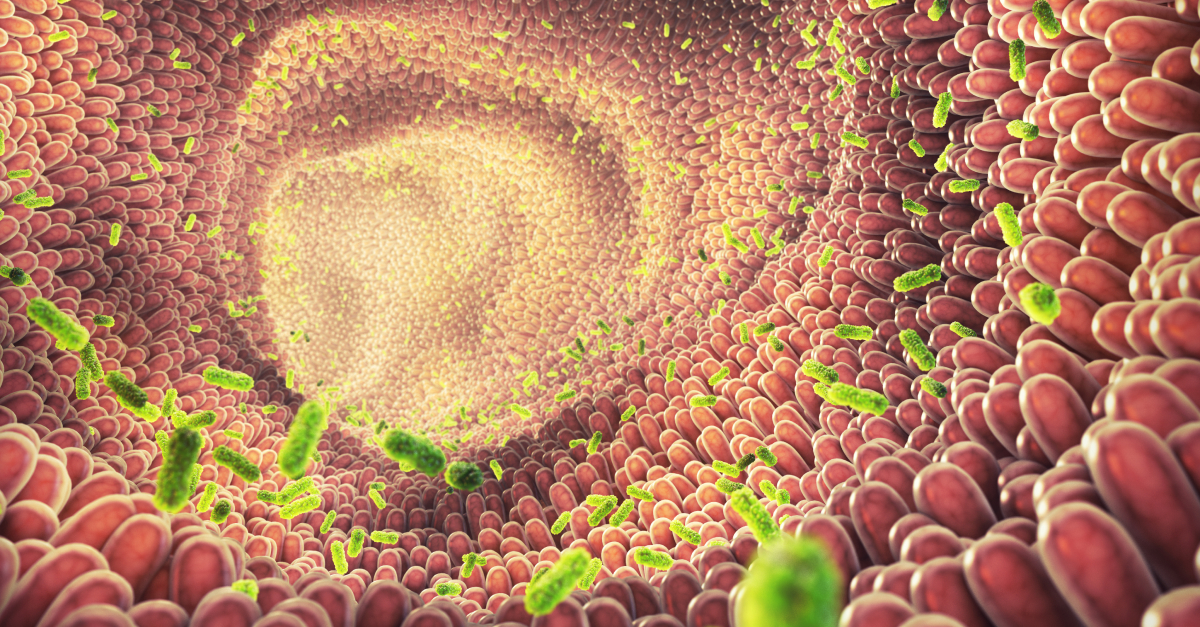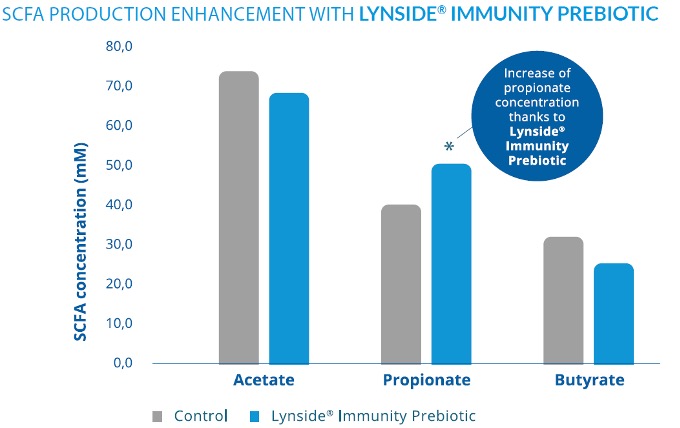
The gut microbiome has a significant impact on one’s health, and scientists are just now beginning to understand all its complexities! Decades of research have shown that the microbiome can be modulated with many distinct types of prebiotics. One thing that most prebiotics have in common, however, is that most of the time, they stimulate the same bacteria species. Lynside® Immunity Prebiotic, manufactured by Gnosis by Lesaffre, modulates the gut microbiota diversity and offers untapped new possibilities for the future.
HIghlights
· Lynside® Immunity Prebiotic is the first prebiotic yeast on the immunity market.
· Lynside® Immunity Prebiotic consists of yeast cell walls gently extracted from Saccharomyces cerevisiae.
· It has a composition of about 25% β-1,3/1,6 glucans fibers, and 25% mannans.
· It is the first yeast prebiotic that can improve the diversity of the microbiome with a low gas production.
· The prebiotic effect is shown through the metabolic activity of the gut microbiota by increasing a specific Short Chain Fatty Acids (SCFA) production adapted to the donor’s microbiota profile.
· The recommended daily dosage is lower than conventional prebiotics.
Don’t confuse microbiota and microbiome anymore!
Sometimes used interchangeably, these two terms have subtle differences. The microbiome refers to the collection of genomes from all the microorganisms in the environment. While microbiota, on the other hand, is a term that refers to all the microorganisms native to an ecosystem. The microbial cells and their genetic material, the microbiome, are intrinsic parts of the human beginning from birth and probably before. This relationship is vital if one wants to ensure normal health and a balanced immune system.
The gut microbiome is quite distinctive and unique. Nevertheless, even though everyone’s microbiome has a distinct signature, it shares a fundamental structure that is similar between all of us. The gut microbiome can be divided into different enterotypes. Each enterotypes has its own microbial composition. These enterotypes are strongly associated with different regions and therefore are affected by one’s lifestyle and food habits.
Dietary components may help or hinder the development of certain microorganisms, and they also contribute to the overall composition of one’s gut microbial genetic pool. This may be accomplished via a change of diet (rich in plant carbohydrates and fibers) but also using food supplementation. In that sense, there are two major components that may play a role in the microbial diversity of the gut: probiotics and prebiotics.
The role of prebiotics on the microbiome
The official definition of a prebiotic is “a selectively fermented ingredient that results in specific changes in the composition and/or activity of the gastrointestinal microbiota, thus conferring benefit(s) upon host health” (1). To summarize, prebiotics are mostly carbohydrate substrates that fed some bacteria, allowing them to thrive and replicate more effectively.
The main gut bacterial phyla are Firmicutes, Bacteroidetes, Actinobacteria, Proteobacteria, Fusobacteria, and Verrucomicrobia. Ninety percent of the gut microbiota are made up of Firmicutes and Bacteroidetes phyla. Those microbes interact with both the epithelial cells lining the gut and cells of the immune system, which in turn helps to balance the immune response (2).
In the past decade, prebiotics have become an important way to support gut homeostasis and immunity. Inulin, Fructooligosaccharides (FOS) and Galactooligosaccharides (GOS) have been the most investigated prebiotics to date. These three prebiotics, however, mainly stimulate the same bacteria species. Therefore, it may be limiting to only rely on two or three prebiotics when there are 100 to 400 bacteria species inhabiting one’s gut microbiota!
Why diversity matters for the gut microbiome
Any ecosystem, like our gut’s community of microbes, must always be kept in a delicate equilibrium state. When our gut microbiome is out of balance (dysbiosis), we may often experience problems. Inflammatory bowel disease, obesity, allergies, and neurodegenerative diseases have all been associated with this type of imbalance. An important function of the gut microbiome is the barrier effect that prevents invasion by a variety of mechanisms, but most importantly, by impacting immune homeostasis (3).
Research suggests that having a wide array of microbes in our gut makes our microbiome more capable and resilient (4). A diverse microbiome may work better than a microbiome with only a few representatives of these species, because if one microbe is unable to perform its function, another may take over.
The more, the merrier, a diverse microbiome is a resilient microbiome! The best diet for the gut microbiome is thus a diverse one that includes a wide range of different foods. And the same is true for prebiotics.
Lynside® Immunity Prebiotic: The game-changer for microbiome diversity
Lynside® Immunity Prebiotic, manufactured by Gnosis by Lesaffre, is the first patented prebiotic yeast with proven effects supported by in vitro studies.
Lynside® Immunity Prebiotic is made through the gentle extraction of yeast cell walls from Saccharomyces cerevisiae. This extraction includes a specific carbohydrate composition of fibers and is a valuable source of mannans and β-1,3/1,6 glucans. All of which have important prebiotic effects.
In vitro studies have shown that Lynside® Immunity Prebiotic may promote a balanced microbiota for different enterotypes. The prebiotic effect may be exerted through enhancement of the metabolic activity of the gut microbiota by increasing SCFA production.

Furthermore, the pattern of SCFA production appears to be dependent on the microbiota signature. Due to its complex carbohydrate composition, Lynside® Immunity Prebiotic can be metabolized either by one bacteria group or another and induce the production of specific SCFA. The enhancement of butyrate and propionate production occurred in a dose-dependent manner of two different microbiota patterns representative of the healthy general population.
The gut microbiota’s ability to make SCFA is well documented in scientific literature and might be connected to:
· the improvement of the gut barrier function.
· direct impact in the mucosal immune cell population.
· potential impacts on other organs in the body.
Preliminary data confirms these immune-stimulatory effects, suggesting Lynside® Immunity Prebiotic can be a valuable prebiotic for supporting immunity. Further research is still needed to confirm this improvement of the immune response.
The positive impact of Lynside® Immunity Prebiotic on microbiota diversity is, however, highlighted in vitro. Its effectiveness has been tested and shown in several in-house studies, and recently, using an ultramodern dynamic model of gut microbiota simulator, namely the PolyFermS® (Polyfermentor Intestinal Model). This is an effective technique for studying mechanisms of the gut microbiome without using a living host (5).
Thanks to its proven prebiotic effects, Lynside® Immunity Prebiotic is a novel prebiotic that has the potential to revolutionize immune health supplements!
Lynside® Immunity Prebiotic is interesting for personalized micronutrition and the design of new dietary supplements or powder functional foods dedicated to immune health.
Learn more about Lynside® Immunity Prebiotic and related in-house studies in our dedicated White paper! Request your copy immediately!
Or do you prefer to see it in a video? Discover Lynside® Immunity Prebiotic on youtube right now.
References:
1) Gibson G.R. et al., Nature Reviews. in Gastroenterology and Hepatology. 2017.
2) Rinninella E. et al. What is the Healthy Gut Microbiota Composition? A Changing Ecosystem across Age, Environment, Diet, and Diseases. Microorganisms. 2019.
3) ILSI Europe Concise Monograph Series. Probiotics, Prebiotics and the gut microbiota. 2013.
4) Dogra SK et al. Gut Microbiota Resilience: Definition, Link to Health and Strategies for Intervention. Front Microbiol 2020; 11:572921
5) Poeker S.A. et al. Understanding the probiotic potential of different dietary fibers using an in vitro continuous adult fermentation model (PolyFermS®). Scientific reports. 2018


